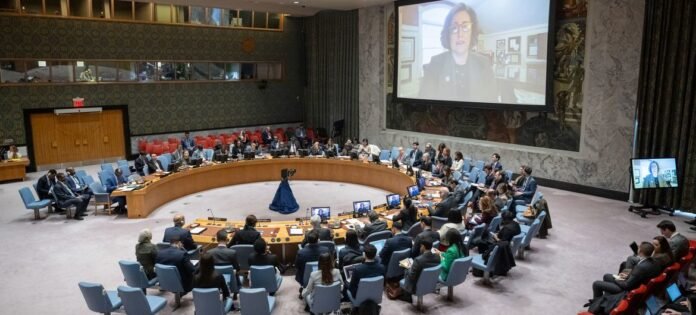Adem Vosornu, Director of Advocacy and Campaigns at the UN Office for the Coordination of Humanitarian Affairs, addressed the Security Council meeting on Monday.
He said Sudan is facing a massive man-made crisis that has plunged the country into dire conflict. As a result, food production systems have been destroyed, infrastructure has been deeply damaged and millions of people are struggling with the ravages of hunger.
Director Vosornu said there are famine conditions in five areas, including Zamzam, Al Salam, Abu Shok and West Nuba Mountain region.
Food and Agriculture Organization Deputy Director-General Beth Bechdol told member states that the main cause of food insecurity in Sudan is the ongoing violent conflict and large-scale displacement of civilians. This has become more serious due to the obstacles in the way of humanitarian aid operations.
Beth Bechdol, Deputy Director-General of the Food and Agriculture Organization, addressed the Security Council meeting.
Challenges in aid operations
Continuous efforts are being made to provide the necessary assistance to poor Sudanese citizens, but this work is facing obstacles.
Adem Vosornu said a convoy of 28 trucks arrived in Khartoum from Port Sudan on December 25, carrying food, nutritional supplies and other forms of aid. However, challenges remain.
“Important areas in South Kordofan have, in a sense, been cut off from outside aid.” Efforts to allow visas for humanitarian aid workers need to be accelerated.
The Adre border post is an important stop for aid reaching Darfur, but a new inspection process has also been introduced there, causing delays.
According to one estimate, more than 90 percent of displaced families in Sudan are unable to feed themselves.
A call for united action
OCHA and FAO officials called on the Security Council to ensure international support for Sudan.
He emphasized the provision of financial resources, availability of safe routes for aid delivery and acceleration of conflict resolution efforts.
$4.2 billion is requested for Sudan to reach 21 million people by 2025, while $1.8 billion will be needed to support Sudanese refugees in neighboring countries.

